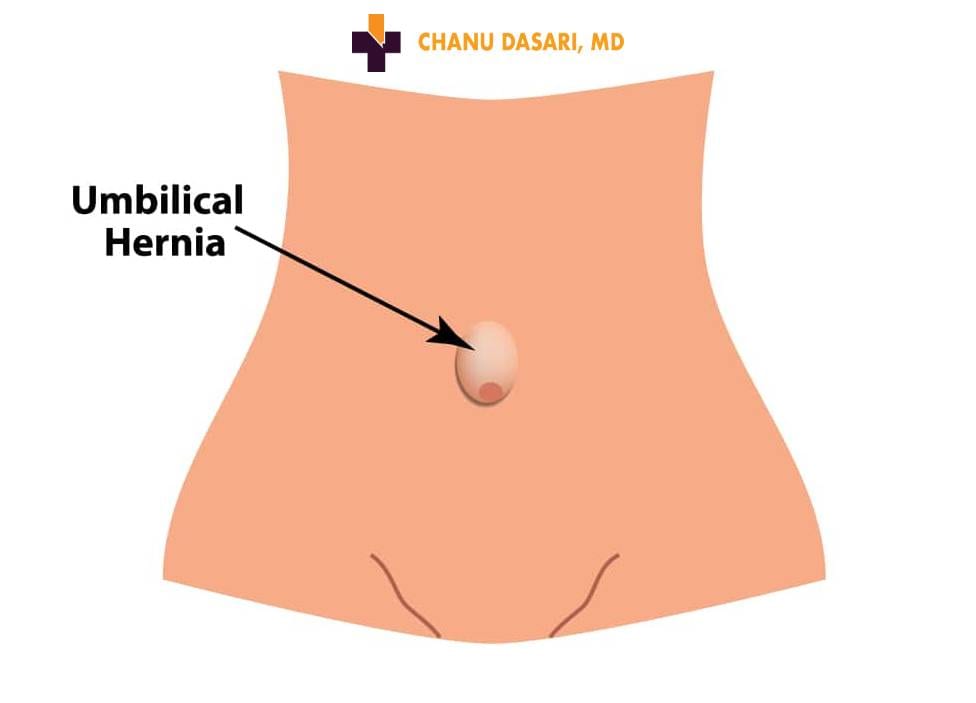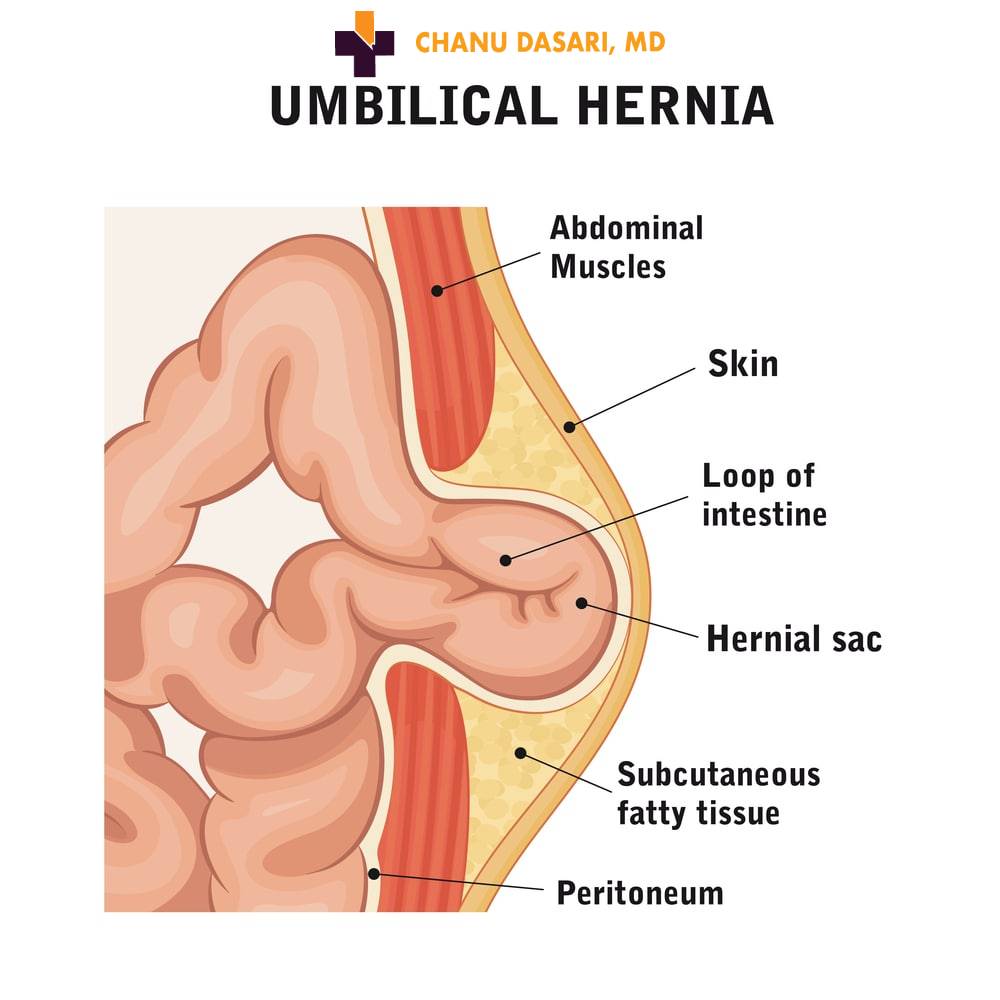Umbilical Hernia
Diagnoses, symptoms, and the very best in umbilical hernia repair treatments.
Dr. Chanu Dasari has provided unmatched expertise in the repair of the most complex umbilical hernias. His patient-centered approach has earned Dr. Dasari the reputation of being one of the highest-rated physicians in Las Vegas.
What is an Umbilical Hernia?
Hernias manifest for a number of reasons. For some people, umbilical hernias begin at birth. Typically, the pediatrician will advise parents to wait until age 5 to see if it “closes.” If it closes at least partially, the child will be left with an “outie” belly button. If it does not close sufficiently, a hernia repair is required. Sometimes an umbilicus that has been closed for a number of years, opens up later in life, causing an umbilical hernia. Due to increased pressure on the abdomen (weight gain, chronic cough, constipation, pregnancy, heavy weight lifting, etc.), internal organs and fat can poke through the wall of the abdomen.
An umbilical hernia is when the belly button pokes outwards due to weakness in the muscles in or around the area. It can develop into an incarcerated hernia containing fat or intestine, which making it a very significant problem.
Dr. Dasari extensively researches to figure out the risk factors that led to hernia formation to avoid problems in the future.
Symptoms of an Umbilical Hernia
Your belly button will usually bulge out if you have an umbilical hernia. It’s important to have your belly button examined by your physician if you notice this. An untreated umbilical hernia can cause serious illness in adults, requiring emergency surgery, and possible intestinal resection due to bowel necrosis. If the skin overlying the hernia becomes darker in appearance, it is a sign that there is increased pressure, which may cause small tears in the skin, and a life-threatening abdominal infection called peritonitis. Even small hernias can cause major problems if symptomatic; therefore a thorough evaluation is usually recommended.
Causes and Risk Factors
Umbilical hernia develops in adults because of extreme pressure in the abdomen. Some of those pressures can occur from a previous surgery in the area, being overweight, numerous pregnancies, and sometimes even from liver and kidney disease.
If there are no symptoms, then the hernia can be observed. However, it is always possible that the intestine can get “trapped” inside with its blood supply cut off, causing life-threatening conditions. If not treated, a small hernia can get larger and more painful. In this setting, umbilical hernia repair surgery is usually considered.
Umbilical Hernia Repair Surgery
Dr. Dasari has a detailed checklist of what you need to do to prepare for surgery. Under anaesthesia, umbilical hernia repair is typically done as an outpatient procedure in about 30 minutes. Typically for smaller hernias, no-mesh/non-mesh umbilical hernia surgery options will be discussed. Most operations are done utilizing state of the art, minimally invasive techniques with only 5 mm incisions!
The goal for umbilical hernia repair surgery is to push the contents of the bulge back into the belly and reinforce the abdominal wall. The two types of umbilical hernia repair surgeries are open and laparoscopic (keyhole). Dr. Dasari performs most surgeries using the laparoscopic approach, unless an anatomic variation requires an open approach.
Laparoscopic and Robotic Surgery
Typically one or two incisions measuring 5mm to 1 cm will be used to fix the hernia. If there is a trapped piece of fat in the hernia, or a deformed belly button, an additional small incision may be created to remove the fat, or secure the umbilicus. Also important to consider: Dr. Dasari can perform no-mesh and non-mesh umbilical hernia surgery if clients are concerned about mesh recalls and complications. Dr. Dasari will discuss the risks, benefits, and alternatives to each surgical method at the consultation.
Keyhole Surgery
Two or three tiny incisions 1 to 2 cm long are made in the lower abdomen area. Dr. Dasari then inserts a telescopic camera to view the umbilical hernia by examining pictures that are sent to a monitor. The hernia repair is then done using specially designed surgical equipment passed through the cuts. Mesh may be applied to strengthen the abdominal walls and the skin cuts are closed with stitches.
The entire procedure generally takes 30 minutes. Reserve an extra hour before the procedure to check in, and an hour for recovery before discharge home. A companion or close contact will need to be present the afternoon/evening after surgery.
What to Expect After the Surgery
The anesthesia wears off in phases. You will be awake, ambulatory, and drinking fluid before discharge home. After discharge, you may still feel groggy, somnolent, and tired. Typically a multimodal pain regimen will be written in the discharge instructions. Also note that with laparoscopic and robotic surgery, it is common for some air in the abdomen to cause tummy bloating and shoulder pain. Also common after anesthesia is constipation, so use stool softeners as directed.
Until the anesthesia wears off, you will need to rest. You may need a pain reliever to aid with any discomfort you may have as the anesthetic wears off. A friend or family member will have to drive you home when you feel ready, and it’s recommended you have someone stay with you for at least the first 24 hours.
Dr. Dasari will guide you through caring for your healing wounds. Typically a waterproof dressing is placed to allow for showering. A direct after-hours answering service is available for any pressing needs.
No insurance? No problem.
Dr. Dasari welcomes and accommodates uninsured, direct-pay clients and offers special discounts for those traveling from other states or countries. If you are looking for the highest quality of minimally-invasive surgical treatments without the involvement of your insurance company contact our caring staff today!
Traveling from Afar?
Dr. Dasari sees patients who are seeking specialized minimally invasive treatments from out of the state such as California, Utah, Arizona, Texas, New York, Florida, Georgia, Kansas, Missouri, Tennessee, Illinois, Indiana, and Hawaii. He also sees patients from outside of the country such as from the UK, Australia, China, Saudi Arabia, and Mexico.
Dr. Dasari’s team assists with arrangements for your visit, including priority appointment times, special accommodations, and travel logistics. An online consultation and health records review will be scheduled.


